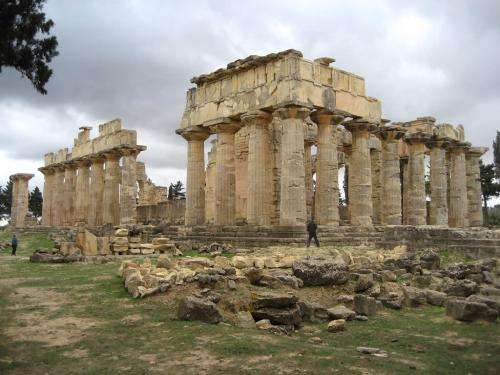January 29, 2015 report
Archeologist urges researchers to study Libya from afar during wartime

(Phys.org) —Italian archeologist Savino di Lernia has published a Comment piece in the journal Nature, urging other archeologists to not abandon Libya during its time of war. He argues that too much is at stake and that much could be lost if researchers simply wait for the war to end.
Libya, di Lernia, points out, is a major area of study for archeologists and historians—prior research has suggested that before the arrival of the Saharan desert, the area was green, even at one point, hosting the largest lake on the planet. Northern Africa, including Libya has a long, rich history with many prominent historical sites, some of which have been designated UNESCO World Heritage Sites. But since the ouster of Muammar Gaddafi nearly four years ago, the area has seen little but strife. As different groups vie to fill the power vacuum, war and chaos have reigned and along with it, little regard for the historical value of artifacts and ancient ruins. Sites have been defaced, ransacked and in some cases even ruined by exploding rockets. Also, shrines have been destroyed by people who felt messages on walls from ancient times conflicted with current views—robbers have pillaged sites looking for artifacts to sell on the black market, and other sites have served as staging areas for raging battles.
Di Lernia is not suggesting that researchers throw caution to the wind by venturing into the war-torn country, instead he is suggesting that other forms of research continue during this time of unrest. He notes that study of artifacts that have been taken out of the country could be done, also digital analysis could be undertaken of documented material. Researchers could also study satellite imagery or use other remote study techniques. He also urges institutions in other countries to invite Libyan scientists to join their programs, thus helping ensure that Libya will not lose its pool of talent, as has been the case with other war-torn countries, such as Syria. He suggests that such measures are the only way to keep Libyan research alive, and is calling on the scientific community to join him in preserving as much of the historical evidence as possible in a country whose future is still very much in doubt.
More information: Cultural heritage: Save Libyan archaeology, Nature, DOI: 10.1038/517547a" target="_blank">nature.com/articles/DOI: 10.1038/517547a
Journal information: Nature
© 2015 Phys.org





















